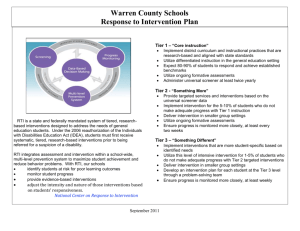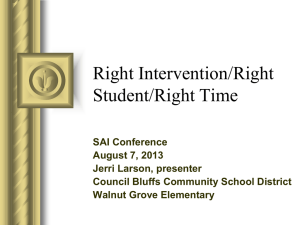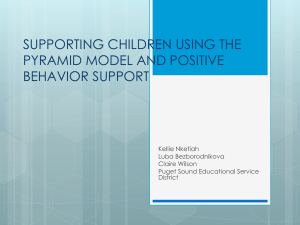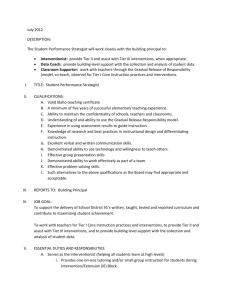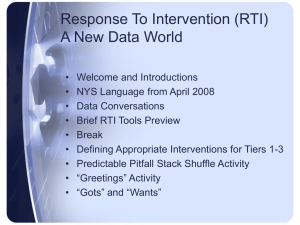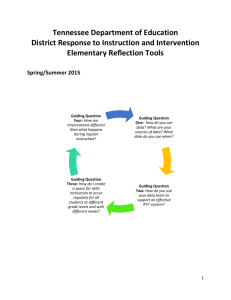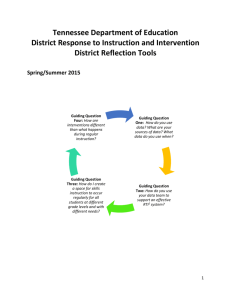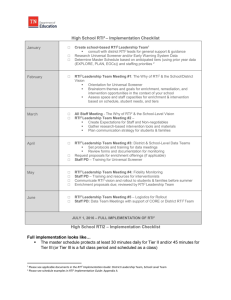RTI Team Activities - Berkeley Unified School District
advertisement
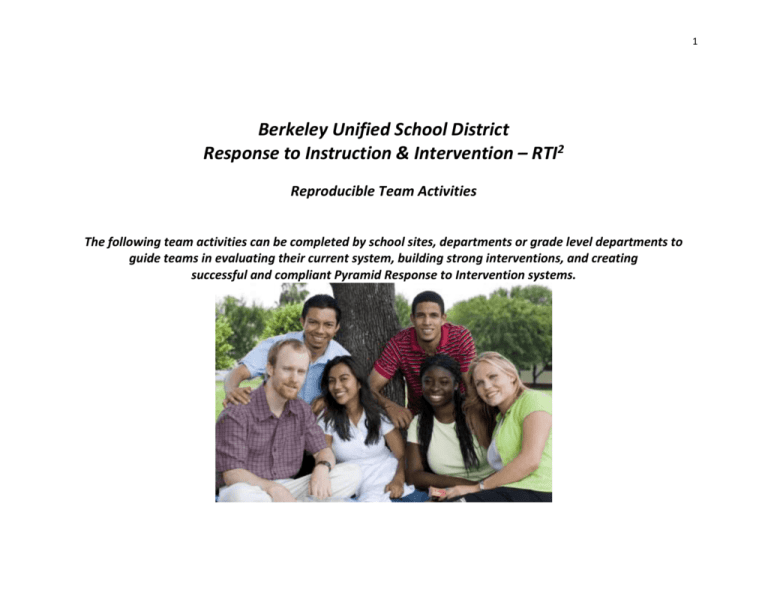
1 Berkeley Unified School District Response to Instruction & Intervention – RTI2 Reproducible Team Activities The following team activities can be completed by school sites, departments or grade level departments to guide teams in evaluating their current system, building strong interventions, and creating successful and compliant Pyramid Response to Intervention systems. 2 Team Activities What is our Tier 1 Core Program? Questions for Tier 1 Our Current Reality Our Desired Outcome (Long-Term Goal) How do we provide all students access to grade-level essential standards? What evidence do we have that our Tier 1 or core practices are research based? What assessments can we use to universally screen students several times a year so that no students fall through the cracks? How can we adjust our curricular and instructional practices to “shore up the core?” How can we provide a first dose of differentiated intervention in our Tier 1 core program? Does our Tier 1 Core program meet the learning needs of at least 75-80% or our students? From Pyramid Response to Intervention, ©2009 Solution Tree www.solution-tree.com Our First Steps (Short-Term Goal) 3 Team Activities What are Our Tier 2 Supplemental Interventions? Questions for Tier 2 Our Current Reality Our Desired Outcome (Long-Term Goal) Which Tier 2 interventions are targeted to help failed learners? Which Tier 2 interventions are targeted to help intentional nonlearners? How do we know that our interventions are research-based, implemented with fidelity, and administered by highly trained staff? What are our decision protocols for the identification and placement of students into Tier 2 Interventions? How often will we monitor progress and revised student placement? From Pyramid Response to Intervention, ©2009 Solution Tree www.solution-tree.com Our First Steps (Short-Term Goal) 4 Team Activities What are Our Tier 3 Intensive Interventions? Questions for Tier 3 Our Current Reality Our Desired Outcome (Long-Term Goal) Which Tier 3 interventions are targeted to help failed learners? Which Tier 3 interventions are targeted to help intentional nonlearners? How do we know that our interventions are research-based, implemented with fidelity, and administered by highly trained staff? What are our decision protocols for the identification and placement of students into Tier 3 Interventions? How often will we monitor progress and revise student placement? What are our decision protocols for the referral of students to formal evaluation to determine special education eligibility? From Pyramid Response to Intervention, ©2009 Solution Tree www.solution-tree.com Our First Steps (Short-Term Goal) 5 How will we Coordinate, Document, and Communicate about our Pyramid Response to Intervention? Key Questions Our Current Reality Our Desired Outcome (Long-Term Goal) How will we communicate our intervention program to students and parents? How will we document what we have done and how it has affected student progress? What is our decision protocol for referral to more intensive tiers and to special education? From Pyramid Response to Intervention, ©2009 Solution Tree www.solution-tree.com Our First Steps (Short-Term Goal) 6 What are our Behavioral Interventions? Questions for Behavioral Interventions Our Current Reality Our Desired Outcome (Long-Term Goal) How will we provide universal support for student behavior at Tier 1 that clearly defines expected behaviors as well as incentives and consequences? How will we provide Tier 2 Interventions and supports that teach replacement behaviors to small groups of students? How will we provide Tier 3 interventions and supports that 1) highly intensive and targeted for individual students and 2) prescribed based upon a behavioral assessment that identifies the antecedents to the undesirable behavior? How do we know that our interventions are research-based, implemented with fidelity, and administered by highly trained staff? What are our decision protocols for the identification and placement of students into behavioral interventions? How often will we monitor progress and revise student placement? From Pyramid Response to Intervention, ©2009 Solution Tree www.solution-tree.com Our First Steps (Short-Term Goal) 7 Team Activities Functional Behavior Analysis Protocol Problem Give a specific example of the problem. What would we actually see the student doing in class? If there is more than one problem, with which problem should we begin? Complexity What other factors are involved? In what other setting does this behavior occur? Has there recently been a change in the frequency or duration of the behavior? Analysis What happens just before the problem occurs? What happens just after the behavior occurs? How do other students react to the behavior? Replacement Behavior What are we asking the student to do when the problem behavior occurs? Is the student already demonstrating some replacement behaviors? What? When? What level of progress will you find to be acceptable? Measurement When during the day would we get the best picture of the problem? How long should we measure the problem? For an entire day, part of a day, or part of a period? How will we measure the behavior? By number of incidents, duration, intensity, or all three factors? Current status What have we done already in response to the behavior? Have some things worked briefly? How have we dealt with similar problems in the past? From Pyramid Response to Intervention, ©2009 Solution Tree www.solution-tree.com 8 Team Activities Who Are Our Under-Represented Students? Under-Represented Student Group Data Supporting Group as Under-Represented Possible Underlying Causes for the Group’s UnderRepresented Status From Pyramid Response to Intervention, ©2009 Solution Tree www.solution-tree.com Our First Steps (Short-Term Goal) 9 Team Activities What Are Our Human and Fiscal Resources? Personnel Programs Categorical (Restricted Funds) From Pyramid Response to Intervention, ©2009 Solution Tree www.solution-tree.com Non-Categorical Funds 10 Team Activities How Do Our School’s Current Practices Align With the Essential Elements of RTI2? Do we have conversations about RTI2and use RTI2 ‘lingo’? Do we have common understanding of key term? Have we embraced that RTI2 is not a special education or regular education program, but rather a school-wide process that requires collective responsibility to ensure that all students learn? Is our core instructional program delivered with fidelity? (TCWRP/ Everyday Math) What about ELD? Do we universally screen all students in the areas of literacy, behavior, and math several times per year Do we frequently progress monitor students at risk using assessments to track their growth at regular intervals? Do we know when to provide students more intensive support? Do we have tools to provide interventions to students that target specific skills? Do we have tools to help monitor student progress? Do we have regular communication in grade level and across grade level teams using data and focused on student learning? (In other words, to what extent do we have PLC’s in place at our site?) Strengths Needs 11 BUSD RTI2 Teams: What is our Current Reality? Questions Who is on the RTI team? What roles do people on the team have? 2 What does the RTI2 team do at your site? How does the RTI2 team relate to other teams at your site? For example: Leadership, PBIS etc. How often does the RTI2 team meet? Who sets the agenda for the team meetings? What is typically on the agenda? What is the referral process at your site? Are teachers aware of the procedure for referrals? Strengths: What is in place and working well? Needs What is happening at my site?

